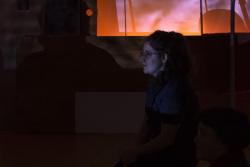Before the coronavirus pandemic, the Writing University conducted a series of interviews with writers while they were in Iowa City participating in the various University of Iowa writing programs. We sat down with authors to ask about their work, their process and their descriptions of home. We've recently caught up with them again to check in. We are posting them now as examples of our shared community strength during this time.
Here is our interview with Literary Translation MFA candidate Kaylee Lockett.

Kaylee Lockett
Kaylee Lockett is currently an MFA candidate in Literary Translation at the University of Iowa where she translates poems from Arabic into English and serves as an editor for Exchanges Journal of Literary Translation. She received her BA in Middle Eastern Studies from Bard College, and has also studied Arabic at Al-Quds Bard and the American University of Beirut. When she is not writing or translating, Kaylee is likely trying to teach her pit mix Ludacris to roll over.
1. Hello Kaylee! Do you have a specific project that you will be working on this year?
I translate from Arabic into English, and my central focus is translating the work of Mohamad Nassereddine, a contemporary Lebanese poet. Nassereddine is also a professor of medical physics, and that subject matter frequently bleeds into his poems. I became enamored with his work several years ago because it’s incredibly playful, despite frequently dealing with heavy subject matter like war, illness, and death. The content of the poems can be playful, but Nassereddine plays with the language itself, too - in a poem about diabetes, for example, he uses a word that means both “blue” and “glaucoma” strategically to reveal its multiple valences. In aiming to bring that playfulness into English, I’m taking up Nassereddine’s project to experiment with the pliability of language. That sort of pliability is exciting, and important to disseminate, because it suggests that if institutions like language can shift and grow, we have the power to shift other institutions and patterns as well.
2. What does your daily practice look like for your writing? Do you have a certain time when you write, or any specific routine?
While I certainly do translation-adjacent work daily, I don’t sit down with a fresh text and a stack of dictionaries every day. Usually while I’m reading something I’d like to translate, my process will begin because a word or phrase or line will stand out to me, either as strange, or exceptional, or particularly “Arabic”, and I’ll think, how would this work in English? As I try to work that small segment into the context of the rest of the poem, a first draft usually unfolds pretty quickly. I try to keep drafts marinating for a long time, because often a possible translation of a tricky phrase or a new approach will occur to me while I’m walking my dog or whatever else, and I’ll jot it down, and it might end up changing the entire poem. I think I could probably do this endlessly, so I’m pretty dependent upon deadlines.
3. What are you currently reading? Are you reading for research or pleasure?
I’m listening to two audio books: Toni Morrison’s collection of essays The Source of Self Regard, which I listen to in the morning when I still have brain power, and Min Jin Lee’s novel Pachinko (which tells the story of a Korean family and their relationship with colonial Japan in the 20th century), which I’ve been listening to with a friend who lives in another state. I just started Samah Selim’s new book Popular Fiction, Translation and the Nahda in Egypt (both research and pleasure - the history of translation during the Nahda, or Arab Renaissance, is fascinating,) and I recently finished Carmen Giménez Smith’s book of poems, Be Recorder.
4. What is one thing the readers and writers of Iowa City should know about you and your work?
I’m interested in written work as dynamic and collective. This interest can seem like a difficult one to champion in a market that favors the individual, but there is also such a drive in writing toward collective story telling and meaning making - every poem that is “after” another poet, or alludes to another poem, or every time Persephone is resurrected as a character, for example, shows us that. It’s also an important cause as a translator, because the enormous contributions of translators have historically been veiled if not totally elided.
5. Tell us about where you are from -- what are a few of your favorite details about your home?
I’m from Oklahoma City, and what I miss most is the food! There is seriously an incredible food scene happening there. I love the beautiful prairie landscape in the southwest of the state, where wild sage and Indian paintbrushes cover the red earth. That famous red dirt also gets stirred up into the sky and produces gorgeous flaming orange and pink sunsets.
**
Thank you Kaylee!